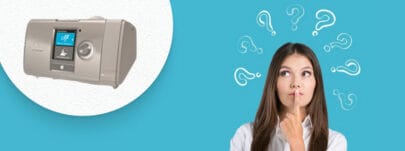
Pros and Cons: Adaptive Servo-Ventilation (ASV) for Sleep Apnea
Since sleep apnea is a rather widespread condition, it’s not surprising that research into its treatment is ongoing. One of the biggest breakthroughs in sleep apnea research came in the 1980s with the development of Continuous Positive Air Pressure (often shortened to CPAP).
Since then, research into new treatment options has mainly revolved around CPAP, with the addition of different types of CPAP machines like APAP or BiPaP.
But more recently, a new treatment option has emerged to help people affected by this sleep disorder. This treatment is called Adaptive Servo-Ventilation (abbreviated to ASV). In this article we look at what ASV entails and what are its pros and cons.
What is Adaptive Servo-Ventilation?
ASV was developed in the late 1990s as an alternative form of treating abnormal breathing patterns. The basic mechanism is the same as in CPAP, meaning that its main role is to deliver pressurized air into the upper airways, to ensure they stay open so you can breathe normally through the night.
ASV devices are also very similar to CPAP machines in their setup. They consist of a main device that pressurizes air to specific settings. Air is then delivered through a hose or tube and over a face mask, which may cover nose and mouth, or only the nose.
How is ASV different from CPAP?
From what we’ve seen so far, it may seem that ASV is pretty much the same as CPAP. However, there is an important difference between these two ways of treating this sleep disorder.
A CPAP machine pressurizes air at a steady rate, which is defined by a sleep specialist based on the patient’s unique needs. In other words, the pressure settings are personalized but don’t change.
On the other hand, an ASV unit starts with a fixed pressure rate, but tracks changes in breathing patterns and automatically adjusts air pressure to those changes. By doing so, ASVs help stabilize breathing throughout the night. You can think about an ASV as a “smart CPAP”.
Another important difference is that ASV therapy has a wider range of applications. CPAP machines are mainly effective in helping alleviate the symptoms of obstructive sleep apnea (OSA), but they have limitations in some complex cases where the sleep disorder co-exists with other conditions.
With that in mind, we can now take a detailed look at the pros and cons of ASV therapy.
What are the pros of ASV?
1. It can help with different types of sleep apnea
As already mentioned in the previous section, CPAP is considered the gold standard for OSA, but there are other types of sleep apnea where it doesn’t offer results.
For example, this applies to central and complex sleep apnea, whose root causes are different from OSA. People affected by these conditions often have a very low breathing rate, meaning that they don’t take enough breaths per minute.
Here, ASV can help stabilize their breathing pattern by adjusting to their unique needs, which is something that CPAP can’t do.
Also, and although this only happens in 5% to 15% of cases, some people develop a complex form of this sleep disorder after starting CPAP. In this situation, Continuous Positive Air Pressure can no longer help and an alternative like ASV may be recommended.
2. Higher comfort levels
Generally speaking, ASV is more comfortable than CPAP. Getting used to CPAP therapy takes some time, since some people find it’s difficult to breathe while the unit is delivering a steady stream of pressurized air into their nose and mouth. Air pressure in ASV units isn’t constant, which adds an extra layer of comfort for the user.
3. Better long-term results
ASV isn’t only different from a comfort point of view. Adherence or compliance is a known issue in CPAP therapy. Studies show that up to 50% of people with obstructive sleep apnea discontinue treatment after one year. This is problematic because treatment compliance is key to seeing an improvement in symptoms. So if ASV is more comfortable to use, it’s also more likely to be effective in the long term.
Cons of ASV
1. Not everyone can use it
Like CPAP, ASV has certain limitations. This treatment isn’t recommended to people who have sleep apnea plus certain other health conditions, such as:
- Chronic hypoventilation.
- Moderate or severe chronic obstructive lung disease.
- Heart disease with congestive heart failure.
2. ASV is more costly
Since this is a rather new technology, it’s usually more expensive than CPAP, which has been around for a while. Although the final cost will depend on insurance and where you are located, you can get a general price comparison between CPAP and ASV here.
Final Thoughts
ASV is an effective, comfortable and reliable way of treating OSA and other forms of this sleep disorder. This therapy can improve sleep quality in situations where CPAP can’t help or where it has failed.
Like other treatment options, there are pros and cons to ASV. Your sleep specialist or sleep technologist will be able to recommend the most suitable treatment based on your particular situation.
Sources:
https://www.aastweb.org/blog/pros-and-cons-of-adaptive-servo-ventilation-asv-for-sleep-apnea
https://www.verywellhealth.com/asv-sleep-apnea-5217474
https://www.webmd.com/sleep-disorders/sleep-apnea/what-is-asv



